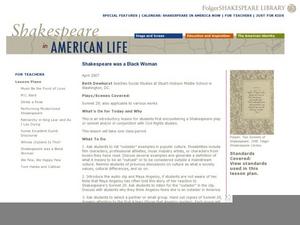Bantam Books
The Tempest: Fishbowl Discussion Strategy
Readers learn together with a group discussion activity. As they read William Shakespeare's The Tempest, high schoolers prepare for a fishbowl discussion in which three or four learners sit in the middle of a large circle and have a...
Curated OER
Discussion Questions for Shakespeare's Julius Caeser
Do not let Julius Caesar be Greek to your pupils. Rather, make the play a dish fit for hungry minds. Encourage your class members to lend their ears to a series of rich discussion questions so that they can become masters of the play, as...
Curated OER
Taming of the Shrew Act 4.5 Study/Discussion Questions
If you're delving into Shakespeare's Taming of the Shrew, this worksheet might be for you! Literature scholars respond to higher-level questions about character actions and motivations and the Zefferelli film version of the play. The...
Penguin Books
A Teacher's Guide to the Signet Classics Edition of Macbeth by William Shakespeare
Double, double scholars' appreciation of the Scottish Play with a guide that adds a rich brew of pre-reading background information, chapter discussion questions, activities, and writing prompts to provide readers with a "firm and good"...
Curated OER
Taming of the Shrew: Act 4.4, Study/Discussion Questions
This 4-question handout addresses key elements of Act 4.4 of Taming of the Shrew. It is intended for small group discussion, followed by individual written reponses. The prompts require critical thinking and analysis.
EngageNY
Analyzing the Resolution of the Play: World Café Discussion
It's time to get active! Scholars participate in a World Café protocol to promote discussion and leadership. They leave their seats and move from group to group to discuss critical questions related to their read-aloud of Shakespeare's A...
Orlando Shakes
Twelfth Night: Study Guide
From lonely to luggage, it would be nearly impossible to have a modern-day conversation without using words that William Shakespeare coined. A Twelfth Night study guide introduces individuals to fun Shakespeare facts as they participate...
Curated OER
Shakespeare Was A Black Woman
"I all alone beweep my outcast state." After a discussion of the "Shakespeare in American Life" segment in which Maya Angelou's relates her reaction to Sonnet 29, class groups create and perform a scene about an outcast that includes the...
EngageNY
Analyzing the Author’s Perspective: “The Shakespeare Shakedown”
Simon Schama's article "The Shakespeare Shakedown" allows young writers to see how authors respond to conflicting viewpoints. Class members participate in discussion appointments with five peers to explore the author's point of view.
Curated OER
Macbeth: Act IV Study Questions
The value in this Macbeth study guide is that it asks readers to not only chart events, but to also consider the significance of those events. The worksheets could be used as preparation for a full class discussion or the basis or a...
Shakespeare Uncovered
War and Leadership in Shakespeare’s Henry V
“Compared to war all other forms of human endeavor shrink to insignificance.” “War is not healthy for children and other living things.” These two views of war, embodied in George Patton’s statement and Lorraine Schneider‘s famous 1966...
PBS
Supernatural Shakespeare and Macbeth
"A drum, a drum! Macbeth doth come." The withered and wild witches of Shakespeare’s Scottish play launch an examination of the fantastical elements in Act I, scene iii, paying particular attention to the action, imagery,...
Reading Shakespeare
Shakespeare Literature Circles Role Sheets
Tired of those blank stares after your class reads a particularly complex passage from a Shakespearean play? Help high schoolers untangle that prose with a literature circle activity. Ten different roles prompt class members to focus on...
Orlando Shakes
Henry V: Study Guide
Shakespeare did more than write timeless literary works—he coined words such as moonbeam, fortune-teller, and even eyeball! A study guide for Henry V introduces key words the Bard first used with a fun vocabulary activity, part of a...
Fluence Learning
Writing About Literature Shakespeare and Plutarch
The Oscar for the Best Adapted Screenplay acknowledges a writer's excellence in adapting material found in another source. What do your class members know about adapted resources? Find out with an assessment that asks readers to compare...
Orlando Shakes
Native Gardens: Study Guide
A study guide for Native Gardens, a dramatic play, introduces theater lovers to a set of a neighbors and the problems they face. Discussion questions in the guide tackle themes of racism, ageism, and classism.
Orlando Shakes
Shakespeare in Love: Study Guide
What word has two syllables and means a ray of moonlight? If young readers guessed moonbeam, they are correct! With the Shakespeare in Love study guide, participants test their guessing skills in an exciting game of Shakespeare Taboo...
Penguin Books
A Teacher's Guide to the Signet Classic Edition of William Shakespeare's The Taming of the Shrew
A study of The Taming of the Shrew proves to be problematic in contemporary classrooms. Is Shakespeare following Elizabethan conventions or being ironic? What are readers supposed to make of all the hunting imagery? Of Katherine's final...
Shakespeare Uncovered
“Speak, I Charge You”: Macbeth On Your Feet, Not In Your Seat
“Is this a dagger which I see before me . . .” As part of a study of Macbeth, class members engage in a series of activities that get them up and moving. Individuals practice, then deliver, a line from the Scottish play. The entire class...
EngageNY
Analyzing the Central Claim and Supporting Claims: “The Shakespeare Shakedown”
Scholars continue to analyze Simon Schama's article "The Shakespeare Shakedown." They participate in a jigsaw discussion to identify the author's argument and supporting claims. Pupils also write objective summaries of the text.
Penguin Books
A Teacher's Guide to the Signet Classic Edition of William Shakespeare's King Lear
King Lear is a powerful and complex tragedy that looks deeply into political power and family dynamics, loyalty, betrayal, aging, and madness. This teaching guide includes scene-by-scene plot summaries, information about the elements of...
Curated OER
What's in a Name? Considering the Shakespeare Authorship Question
Did Shakespeare really write all that stuff? After viewing a trailer for the film, Anonymous and reading Stephen Marche’s article “Wouldn’t It Be Cool If Shakespeare Wasn’t Shakespeare?” class groups read articles about the Shakespeare...
Shakespeare Uncovered
Women’s Roles in As You Like It
“There is nothing that becommeth a maid better than soberness, silence, shamefastness, and chastity, both of body & mind.” This line, from Thomas Bentley ‘s The Monument of Matrons published in 1582, typifies the way women were...
Prestwick House
Teaching Shakespeare: Sonnet 73
It's that time of year to consider how Shakespeare selects his images and structures his Sonnet 73 to develop the meaning of the poem. Class members examine the rhyme scheme, the indented lines, the conceit, and the images used in each...

























